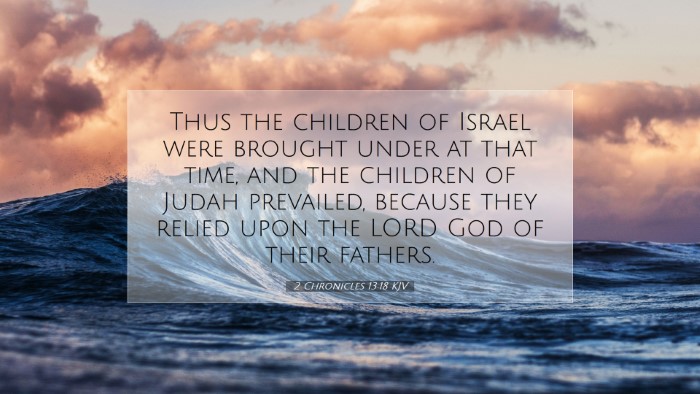Commentary on 2 Chronicles 13:18
Verse Summary: "Thus the children of Israel were brought under at that time; and the children of Judah prevailed because they relied upon the LORD God of their fathers." (2 Chronicles 13:18)
Context and Background
2 Chronicles 13 presents an account of a significant conflict between King Abijah of Judah and King Jeroboam of Israel. This chapter sheds light on the theological implications of obedience and reliance on God in times of conflict.
The Historical Setting
Matthew Henry comments on the turmoil between the divided kingdoms of Israel and Judah, emphasizing that this tumultuous period is marked by ongoing strife and struggles for dominance. Abijah's reign, though brief, was pivotal as he sought to restore faithfulness to the God of Israel.
Theological Implications
In this verse, we see the principle of divine support contingent upon reliance on God. This idea is central to the narrative—not just as a historical record but as a lesson for God's people throughout generations.
Detailed Analysis
1. The Nature of Reliance on God
Albert Barnes provides insight into what it means to rely upon the LORD. The Hebrew term used in this context indicates a complete and total dependence, suggesting that Judah's military success was not due to their might but their faith in God.
- Faith as a Catalyst: The reliance mentioned here reflects an active trust—a belief that God would intervene.
- Covenantal Relationship: Abijah's declaration of dependence aligns with the covenantal themes present in Israel's history. It showcases the expectation that obedience leads to divine favor.
2. The Outcome of Divine Reliance
Adam Clarke emphasizes the critical aspect of the narrative: the victory that Judah experienced. He notes that the text serves to illustrate the concept that divine assistance is granted to those who faithfully adhere to God's commands.
- Victorious Faith: The victory over Israel is attributed directly to Judah's adherence to God. Clarke cites similar examples throughout the Scriptures where reliance on God yielded successful outcomes.
- Covenant vs. Rebellion: The fallout between the kingdoms is not merely political; it signifies a spiritual battle. Jeroboam represents rebellion against God, while Abijah is shown as a reformer striving for righteousness.
3. The Broader Implications for Leadership
For pastors and leaders, Henry points out that this verse provides a striking reminder of the importance of spiritual leadership. Effective leadership rests in a foundation of godliness and dependence on God.
- Spiritual Accountability: Leaders are called to model reliance on God, serving as examples to their congregations in times of trial.
- Legacy of Righteousness: Abijah’s actions, though brief, cement his legacy as a king who distinguished himself by the acknowledgment of God’s sovereignty.
Applications for Today
In contemporary Christian contexts, this verse encourages believers to place their trust in God amidst adversities. It challenges modern notions of self-sufficiency by asserting that ultimate victory and success lie in divine dependence.
- Encouragement in Trials: Just as Judah faced formidable challenges, believers are reminded that God is a powerful ally amidst their struggles.
- The Call to Repentance: This historical narrative invites reflection on personal and corporate faithfulness. The example of Abijah advocates for collective reliance on God to restore health and direction to communities.
Conclusion
2 Chronicles 13:18 serves as a profound reminder that victories in life come not from human strength or strategy but from a humble and sustained reliance upon the LORD. The historical narrative encapsulates key theological principles that remain pertinent for today’s believers, urging them to trust in God’s providence amidst the various challenges they face.


